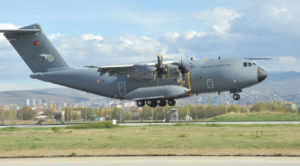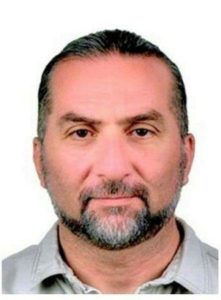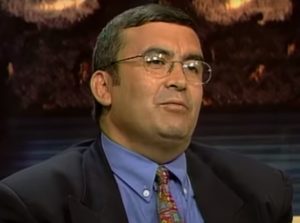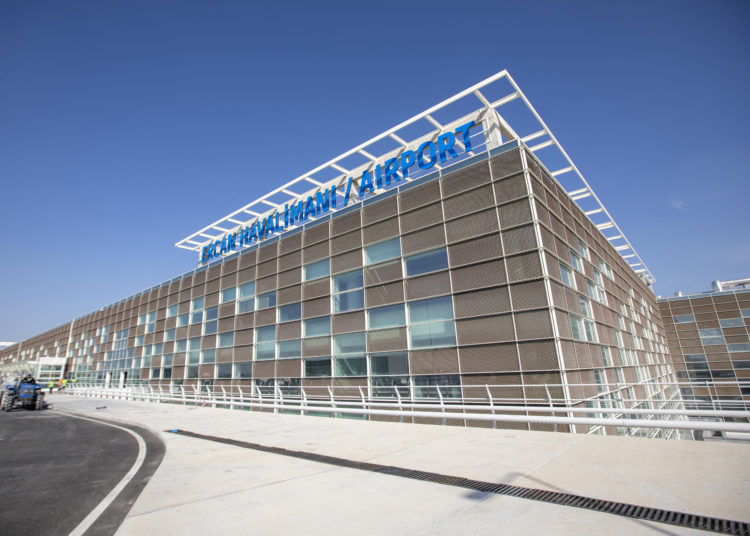Abdullah Bozkurt/Stockholm
Turkish special forces have been using an airport in the breakaway Turkish Republic of Northern Cyprus (KKTC) to mask clandestine operations including an extrajudicial murder to help shape the political landscape in Turkey, an indictment filed with a Turkish court has inadvertently exposed.
According to the indictment filed on November 11, 2022 in a cold case concerning the murder of Necip Hablemitoğlu, a neo-nationalist academic who was killed on December 18, 2002 in front of his apartment building in Ankara, the killer secretly flew from Kazakistan to Ercan Airport in the KKTC, continuing on to Turkey on a military plane.
The killer, former colonel Ahmet Tarkan Mumcuoğlu, was on an assignment in Kazakstan, leading a team of the Combat Search and Rescue (MAK), an elite force attached to the Special Forces Command (ÖKK), and serving as MAK’s counterintelligence officer. When the hit was green lighted by his superiors, Mumcuoğlu took a flight on Turkish Airlines from Almaty to Ercan and then switched to a military plane to land at Ankara’s Etimesgut military airport.
After the murder, he took the same route back to Kazakstan, making it appear as if he had never left the country. He was operating under orders for radio silence, did not register his arrivals and departures through Ercan Airport, under the control of the Turkish military, which maintains tens of thousands of troops in the KKTC, recognized as an independent state only by Turkey.
The military flights between Ercan and Turkey were organized by the Turkish Air Force, and ÖKK members often use such flights to move personnel and cargo. Although Turkish Airlines (THY) operates daily direct flights between Istanbul and Almaty, the killer used tickets to and from Ercan Airport in order to cover his tracks and not register his actual arrivals and departures.
Court records confirm how Ercan Airport was used by the Turkish military to conduct secret operations:
Two decades later, a reopened investigation uncovered that the killer made a mistake and broke radio silence to communicate with his wife and father, which confirmed that he was in Turkey at the time of the murder. Mumcuoğlu continued to serve with the military until November 2012 and was later recruited by Turkish intelligence agency MIT, where he worked until his retirement in 2021.
The case confirms how the Turkish military used Ercan Airport for clandestine operations and to move personnel and cargo not just for operations in the KKTC but also as a way to hide secret operations beyond the island.

The prosecutor asked the Security Directorate General’s (Emniyet) border control department to investigate whether Mumcuoğlu had any entry and exit records at Ercan Airport in 2002 and 2003. The Emniyet referred the question to the KKTC police. According to a letter sent by the KKTC Police Directorate’s Immigration Authority (KKTC Polis Genel Müdürlügü Muhaceret Müdürlügü) on September 1, 2022, there was no record of entry or exit for Mumcuoğlu.
The investigation revealed that none of the military personnel who used military cargo planes to fly between Turkey and the KKTC were ever registered by the KKTC authorities.
The prosecutor also sought to obtain THY records for flights between the KKTC and Kazakhstan, but in a letter to the prosecutor’s office on August 3, 2022 Turkish Airlines stated that they keep passenger flight records for 10 years and that older records were automatically deleted by the system. A similar attempt to obtain records for military flights from the General Staff’s Logistics Directorate failed as well. The General Staff told the prosecutor on February 15, 2022 that it keeps records for cargo and passenger manifests for military flights for only a year.
List of Turkish military flights over Cyprus in 2022, part of a complaint to the United Nations:
The revelation raised questions as to what other clandestine operations Turkey used Ercan Airport for in order to cover its tracks. The airport is located in the village of Tymvou in the north of the island, the location of a British military airport that was built during World War II and later abandoned after Cyprus became an independent state. However, the Turkish military reopened the airport after a 1974 operation on the island. It is used today for both military and civilian aviation.
According to complaints submitted to the United Nations by the internationally recognized Cyprus government, Turkey regularly used the airport for military cargo flights involving CN-235, A-400, B-200 and ATR-72 aircraft. The Cyprus government considers all such Turkish flights to be violations of the flight information region in breach of the country’s national airspace and international air traffic regulations. A total of 560 air and 33 naval violations were observed during this eight-month period, the Cypriot government said in a letter sent to the UN on December 16, 2022.
In response the Turkish Cypriot government denied the Greek Cypriot claims of jurisdiction over flights within the sovereign airspace of the KKTC, adding that Ercan Airport is in full conformity with all standards recommended by the International Civil Aviation Organization. In a letter to the UN, it explained that the Ercan area control center is in regular and close cooperation with the Ankara area control center to ensure the safe conduct of all flights in the region.

A total of 4,035,276 passengers used Ercan Airport in 2019. Moreover, 27,760 planes used the airport for arrivals and departures and 224,898 planes used the Ercan advisory airspace in the same year, according to data announced by the Turkish Cypriot government.
Apparently, Turkey uses Turkish Cyprus not only to project its power in the Mediterranean but also to at times run secret operations to influence the domestic political landscape. The murder of Hablemitoğlu, verified in court documents, was such an operation.
Mumcuoğlu was a secret contact of the academic and was feeding him information and passing classified documents to him, some of which turned out to be fabricated, as part of a clandestine psychological warfare operation.
Based on the documents and information he received, Hablemitoğlu was writing articles and books, making speeches and providing commentary to support the operation sanctioned by the renegade neo-nationalist (ulusalcı) military commanders who wielded influence on the National Security Council (MGK), a top consultative body that was described as a shadow government. His writings were strongly anti-Western and anti-Semitic, with a special focus on German foundations that were accused of operating with malicious intent to harm Turkey.
However, in time, Hablemitoğlu had quietly shifted his alliances and started getting close to the Justice and Development Party (AKP), the then-main foe of the neo-nationalists. He was secretly passing confidential documents and information that were given to him by military people such as Col. Hasan Atilla Uğur and the MGK secretary, retired Gen. Tunçer Kılınç, both of whom were staunchly anti-Western figures.

Furious neo-nationalists who had used Hablemitoğlu for psychological warfare under the cover of journalism felt betrayed and decided to sanction the hit on his life. The murder contract was handed to the MAK unit, which was commanded at the time by Mustafa Levent Göktaş, a neo-nationalist colonel who was brought in to run the unit by similarly minded generals.
The murder remained unsolved for decades until a whistleblower, an accomplice to the murder, came forward and named Mumcuoğlu as the killer in 2014. Even then, the government of President Recep Tayyip Erdoğan did not make any attempt to reopen the case, mainly because revelation of the identities and associates of the killer and masterminds would not sit well with the neo-nationalists, with whom he had forged an alliance in 2014. Erdoğan did not want to risk a rupture. He needed the neo-nationalists to run the country and fill vacant positions left by a mass purge of civil servants in the judiciary, police and intelligence agency as well as members of the military.
The renewed investigation into the murder put a spotlight on İnan Kıraç, dubbed the “Lord of Darkness” in organized crime circles, because Göktaş, the indicted MAK commander who ordered the killing, had been working closely with the billionaire businessman, who has wielded influence in politics, the military and the intelligence apparatus from the shadows for decades.
Neither Kıraç nor neo-nationalist generals who sanctioned the murder were named as suspects in the indictment, which indicates the secret bargain between Erdoğan’s Islamist bloc and the neo-nationalists is still holding. The billionaire’s name and others may come up again in the future if the deal between Erdoğan and the neo-nationalists is shattered.












